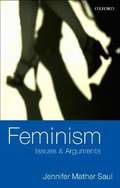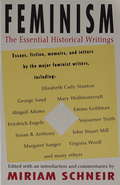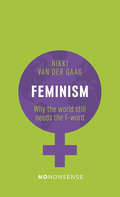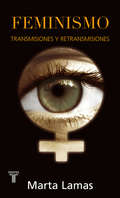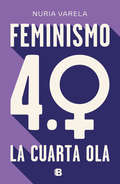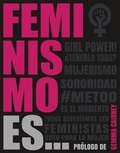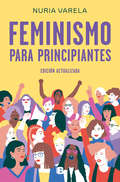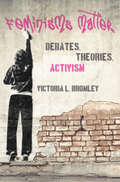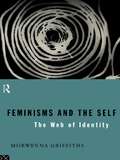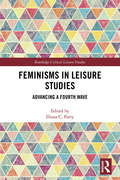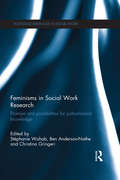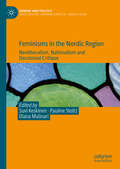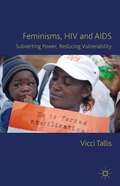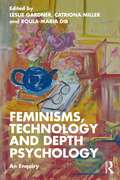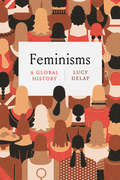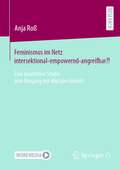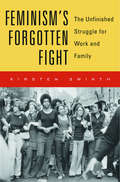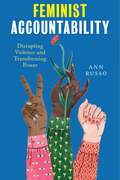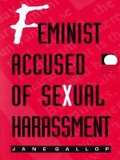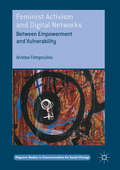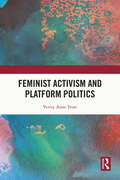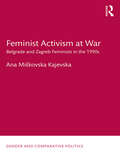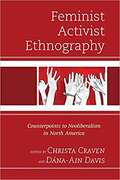- Table View
- List View
Feminism: Issues & Arguments
by Jennifer SaulFilling a gap in the textbook market, Feminism: Issues & Arguments provides an accessible and stimulating introduction to feminist philosophy that assumes no background in the subject. Drawing on both philosophical thought and up-to-date empirical research, Jennifer Mather Saul provides lucid arguments for a variety of feminist positions but avoids advocating any particular position so that students will be motivated to think critically. The chapters are organized around key topics including pornography, abortion, sexual harassment, and the politics of work and family. By focusing on real-world applications of feminist philosophy, this text brings the subject to life for students because it deals with issues that they care about. Feminism: Issues & Arguments is ideal for courses in feminism, feminist philosophy/philosophy of women, and sociology of women.
Feminism: The Essential Historical Writings
by Miriam SchneirHere are the essential historical writings of feminism. Many of these works, long out of print or forgotten in what Miriam Schneir describes as a male-dominated literary tradition, are finally brought out of obscurity and into the light of contemporary analysis and criticism. Included are more than forty selections, coveting 150 years of writings on women's struggle for freedom -- from the American Revolution to the first decades of the twentieth century.This updated, wide-ranging collection encompasses the crucial issues of women's oppression. A surprising degree of continuity between the ideas of the old and the new feminism is evident throughout. In her selection, Miriam Schneir has by passed writings that deal exclusively with the outdated topic of suffrage in an effort to focus attention on the still unsolved feminist problems: marriage as an instrument of oppression; woman's desire to control her own body; the economic independence of women; the search for selfhood.This richly diverse collection contains excerpts from books, essays, speeches, documents, letters, as well as poetry, drama, and fiction. Extensive commentaries by the editor help the reader see the historical context of each selection.
Feminism: Why the world still needs the F-word
by Nikki van der GaagFar from being in a "post-feminist" age we've seen recently a resurgence of feminist campaigning among women (and some men). There's a new brand of feminism: young, social-media savvy, militant. But there's a new kind of backlash, driven by so-called fundamentalists and by increasingly overt misogyny.This book gives a unique international perspective to the advances and challenges worldwide.
Feminismo
by Marta Lamas¿Qué ha pasado en los últimos treinta y cinco años en el feminismo en México?Estos ensayos son parte de un ejercicio que Marta Lamas ha venido haciendo desde hace años y que responden al interés de transmitir y retransmitir el conocimiento, las reflexiones y las experiencias feministas para provocar el debate en las nuevas generaciones. Para quienes piensan sobre los problemas de la diferencia sexual y el género en nuestra sociedad y para quienes actúan día a día en la construcción de relaciones más equitativas entre mujeres y hombres.
Feminismo 4.0. La cuarta ola
by Nuria VarelaNuria Varela nos ofrece la continuación a su best seller Feminismo para principiantes. En este libro, Varela realiza un análisis riguroso y esclarecedor de las últimas teorías, movilizaciones y propuestas del movimiento político y social que, con sus aciertos y contradicciones, está poniendo en jaque la desigualdad estructural de la sociedad. Políticas de la identidad, posfeminismo, feminismos poscoloniales, teoría queer, transfeminismo, interseccionalidad, biopolítica y ciberfeminismo son solo algunos de los conceptos que se tratan en este nuevo libro, indispensable para entender el momento crucial en que nos encontramos.
Feminismo es...
by Varios autoresUn libro accesible para adolescentes sobre la historia, pioneros, teorías, preguntas, argumentos y la realidad cotidiana del feminismo actual. ¿Qué es el feminismo? Combinando texto perspicaz con ilustraciones gráficas, este atractivo libro presenta a los lectores jóvenes un tema que debería ser importante para todos. Feminismo es ... aborda los temas más interesantes y relevantes, como "¿Son todas las personas iguales?", "¿Aprenden los niños y las niñas las mismas cosas?" y "¿Pueden los hombres ser feministas?" DescubrE lo que realmente significa igualdad para las mujeres, obtén una breve historia del feminismo y echa un vistazo a los problemas que afectan a las mujeres en el trabajo, en el hogar y en torno al sexo y la identidad. Conoce a grandes mujeres, como Gloria Steinem, Frida Kahlo y Malala Yousafzai, "chicas rebeldes" que se negaron a aceptar el status quo de su día y abrieron un camino para que otras lo siguieran. Con un prólogo de Gemma Cairney, locutora, autora, activista y entusiasta de la vida galardonada con múltiples premios, y más de 50 temas que abordan preocupaciones feministas clave, el feminismo es ... aborda los temas, es informativo y siempre pensó: provocador.
Feminismo para principiantes (Sine Qua Non Ser.)
by Nuria VarelaEdición revisada, actualizada y ampliada del libro de referencia, en España, de la historia del feminismo. ¿Quiénes eran las sufragistas? ¿De dónde sale el feminismo radical? ¿Por qué se habla de marxismo y feminismo como de un matrimonio mal avenido? ¿Por qué el feminismo ha sido vilipendiado y ridiculizado? ¿Por qué las feministas han sido tratadas de "marimachos", feas o mujeres sexualmente insatisfechas? ¿Cómo y dónde surge la expresión "violencia de género"? ¿En qué consiste la masculinidad tradicional? A partir de estos interrogantes, y otros muchos, Nuria Varela repasa tres siglos de hacer y deshacer el mundo, de alumbrar teorías, propuestas y liderazgos fascinantes, y narra la aventura de una agitación social que ningún otro movimiento ha conseguido mantener durante tanto tiempo.
Feminisms Matter: Debates, Theories, Activism
by Victoria BromleyIn this lively narrative, newcomers to women's and gender studies, feminist politics, history, and sociology explore a refreshing take on a subject matter often loaded with assumptions. Feminist theories are viewed through the critical intersections of race, class, sexuality, age, and ability, and are embedded in the experiences of everyday life, allowing Bromley to engage readers in doing theory, in making sense of concepts like "power" and "privilege," and in effecting social change. Using a variety of pedagogical devices, including provocative images, discussion questions, and classroom activities, Feminisms Matter helps readers cultivate a way of thinking critically about their everyday worlds.
Feminisms and the Self: The Web of Identity
by Morwenna GriffithsWhat does the politics of the self mean for a politics of liberation? Morwenna Griffiths argues that mainstream philosophy, particularly the anglo-analytic tradition, needs to tackle the issues of the self, identity, autonomy and self creation. Although identity has been a central concern of feminist thought it has in the main been excluded from philosophical analysis. Feminisms and the Self is both a critique and a construction of feminist philosophy. After the powerful challenges that postmodernism and poststructuralism posed to liberation movements like feminism, Griffiths book is an original and timely contribution to current debate surrounding the notion of identity and subjectivity.
Feminisms in Leisure Studies: Advancing a Fourth Wave (Routledge Critical Leisure Studies)
by Diana ParryFeminisms in Leisure Studies acknowledges and advances the contribution of feminist theories to leisure knowledge and research. Building upon the strong history of feminist leisure scholarship, the book reviews key feminist theories and offers an overview of a fourth wave of feminism and its relevance to leisure. Written by a team of leading international feminist scholars, each chapter addresses a particular theoretical perspective, using examples from each author’s research to unpack methodological and substantive issues essential to leisure studies. Critically, this book moves beyond women, the emphasis of much gender scholarship to date, to focus on issues of feminism as connected to leisure scholarship more broadly. This book is an important and engaging read for students and scholars of diversity, women’s studies, multiculturalism, social justice, gender studies, leisure studies, LGBTQQ studies, and feminist research.
Feminisms in Social Work Research: Promise and possibilities for justice-based knowledge (Routledge Advances in Social Work)
by Stéphanie Wahab Ben Anderson-Nathe Christina GringeriSocial work as a profession and academic discipline has long centered women and issues of concern to women, such as reproductive rights, labor rights, equal rights, violence and poverty. In fact, the social work profession was started by and maintained in large part by women and has been home to several generations of feminists starting with recognized first wave feminists. This wide-ranging volume both maps the contemporary landscape of feminist social work research, and offers a deep engagement with critical and third wave feminisms in social work research. Showcasing the breadth and depth of exemplary social work feminist research, the editors argue that social work’s unique focus on praxis, daily proximities to privilege and oppression, concern with social change and engagement with participatory forms of inquiry place social workers in a unique position to both learn from and contribute to broader social science and humanities discourse associated with feminist research. The authors attend here to their specific claims of feminisms, articulate deep engagement with theory, address the problematic use of binaries, and engage with issues associated with methods that are consistently of interest to feminist researchers, such as power and authority, ethics, reflexivity, praxis and difference. Comprehensive and containing an international selection of contributions, Feminisms in Social Work Research is an important reference for all social work researchers with an interest in critical perspectives.
Feminisms in the Nordic Region: Neoliberalism, Nationalism and Decolonial Critique (Gender and Politics)
by Diana Mulinari Suvi Keskinen Pauline StoltzThis book explores how feminist movements in the Nordic region challenge the increasing gender, race and class inequalities following the global economic crisis, neoliberal capitalism and austerity politics, and how they position themselves in the face of the rise of nationalism and right-wing populism. The book contextualizes these recent events in the long histories of racial and colonial power relations embedded in Nordic societies and their gender equality and welfare state regimes. It examines the role of whiteness and racism and seeks to decolonize feminist knowledge and genealogies of feminist movements in the region. The contributions provide in-depth knowledge on the different orientations, dilemmas and tactics that feminisms develop in these challenging times and show the centrality of antiracist and decolonizing critiques of feminisms. They further highlight the strategies of feminist and related antiracist and indigenous movements in regards to ideas about hope, solidarity, intersectionality, and social justice.Chapters 6, 7, 9 and 10 are available open access under a Creative Commons Attribution 4.0 International License via link.springer.com.
Feminisms, HIV and AIDS
by Vicci TallisWomen are disproportionately affected by HIV and AIDS. By focusing on the pandemic at its epicentre in Southern Africa, this book explores the gendered power inequalities driving women's vulnerability to HIV and provides suggestions of how to individually and collectively address women's oppression.
Feminisms, Technology and Depth Psychology: An Enquiry
by Leslie Gardner Roula-Maria Dib Catriona MillerFeminisms, Technology and Depth Psychology explores the intersection of a variety of feminist thought with technology through the lens of depth psychology, and investigates how current approaches to technology impact female life globally – from internet use, to biotechnology, to how female creators imagine life.This thought‑provoking collection is a discussion on changing female capacities and creativity. It questions whether female oppression is becoming more easily enabled within the context of technology use, touching on topics of manipulation, ecological awareness, female decision making, and more. Part One is a three‑chapter investigation on queer history, birthing, and reproductive technologies in science fiction novels. Part Two explores images of females and technology in a variety of cultural products ranging from science fiction films to contemporary TV dramas and novels. Part Three looks at the political impact of technology on female worlds, and Part Four examines perspectives on the creative process behind writing science fiction and fantasy. Feminisms, Technology and Depth Psychology will appeal to Jungian analysts and psychotherapists, and analytical psychologists. It also offers insightful perspectives to academics and students of psychology, gender studies, and politics.
Feminisms: A Global History
by Lucy DelapFeminism’s origins have often been framed around a limited cast of mostly white and educated foremothers, but the truth is that feminism has been and continues to be a global movement. For centuries, women from all walks of life have been mobilizing for gender justice. As the last decade has reminded even the most powerful women, there is nothing “post-feminist” about our world. And there is much to be learned from the passion and protests of the past. Historian Lucy Delap looks to the global past to give us a usable history of the movement against gender injustice—one that can help clarify questions of feminist strategy, priority and focus in the contemporary moment. Rooted in recent innovative histories, the book incorporates alternative starting points and new thinkers, challenging the presumed priority of European feminists and ranging across a global terrain of revolutions, religions, empires and anti-colonial struggles. In Feminisms, we find familiar stories—of suffrage, of solidarity, of protest—yet there is no assumption that feminism looks the same in each place or time. Instead, Delap explores a central paradox: feminists have demanded inclusion but have persistently practiced their own exclusions. Some voices are heard and others are routinely muted. In amplifying the voices of figures at the grassroots level, Delap shows us how a rich relationship to the feminist past can help inform its future.
Feminisms: A Global History
by Lucy DelapFeminism’s origins have often been framed around a limited cast of mostly white and educated foremothers, but the truth is that feminism has been and continues to be a global movement. For centuries, women from all walks of life have been mobilizing for gender justice. As the last decade has reminded even the most powerful women, there is nothing “post-feminist” about our world. And there is much to be learned from the passion and protests of the past. Historian Lucy Delap looks to the global past to give us a usable history of the movement against gender injustice—one that can help clarify questions of feminist strategy, priority and focus in the contemporary moment. Rooted in recent innovative histories, the book incorporates alternative starting points and new thinkers, challenging the presumed priority of European feminists and ranging across a global terrain of revolutions, religions, empires and anti-colonial struggles. In Feminisms, we find familiar stories—of suffrage, of solidarity, of protest—yet there is no assumption that feminism looks the same in each place or time. Instead, Delap explores a central paradox: feminists have demanded inclusion but have persistently practiced their own exclusions. Some voices are heard and others are routinely muted. In amplifying the voices of figures at the grassroots level, Delap shows us how a rich relationship to the feminist past can help inform its future.
Feminismus im Netz intersektional-empowernd-angreifbar?!: Eine qualitative Studie zum Umgang mit digitaler Gewalt
by Anja RoßFeministische Aktivist*innen haben sich schon immer verschiedener Medien bedient, um zu kommunizieren, sich zu artikulieren und zu vernetzen. Durch die Digitalisierung und die damit verbundenen Möglichkeiten erweitern sich feministische Aktionsräume und verlagern sich zunehmend ins Social Web. So lässt sich feststellen, dass Plattformen wie twitter, instagram oder auch facebook vielfach genutzt werden, um feministische Anliegen in die Öffentlichkeit zu tragen. Der gegenwärtige mediale Diskurs um feministische Ideen und Forderungen wird dabei maßgeblich durch antifeministische Akteur*innen beeinflusst, deren Anliegen es ist, feministische Stimmen aus dem medialen Raum zu verbannen. Die vorliegende Arbeit greift diese Thematik auf und geht der Frage nach, wie feministische Aktivist*innen antifeministische, digitale Gewalt wahrnehmen und damit umgehen. Die Ergebnisse verweisen darauf, dass insbesondere Aspekte der Sexuellen Identität und der Mehrfachdiskriminierung entscheidend sind für das Ausmaß der digitalen Gewalt, die erfahren wird. Weiterhin wird deutlich, welche Rolle Solidarität, Vernetzung und Empowerment im Kampf gegen den Antifeminismus spielen.
Feminism’s Forgotten Fight: The Unfinished Struggle for Work and Family
by Kirsten SwinthKirsten Swinth reconstructs the comprehensive vision of feminism’s second wave at a time when its principles are under renewed attack. In the struggle for equality at home and at work, it was not feminism that failed to deliver on the promise that women can have it all, but a society that balked at making the changes for which activists fought.
Feminist Accountability: Disrupting Violence and Transforming Power
by Ann RussoExplores accountability as a framework for building movements to transform systemic oppression and violence What does it take to build communities to stand up to injustice and create social change? How do we work together to transform, without reproducing, systems of violence and oppression?In an age when feminism has become increasingly mainstream, noted feminist scholar and activist Ann Russo asks feminists to consider the ways that our own behavior might contribute to the interlocking systems of oppression that we aim to dismantle. Feminist Accountability offers an intersectional analysis of three main areas of feminism in practice: anti-racist work, community accountability and transformative justice, and US-based work in and about violence in the global south. Russo explores accountability as a set of frameworks and practices for community- and movement-building against oppression and violence. Rather than evading the ways that we are implicated, complicit, or actively engaged in harm, Russo shows us how we might cultivate accountability so that we can contribute to the feminist work of transforming oppression and violence. Among many others, Russo brings up the example of the most prominent and funded feminist and LGBT antiviolence organizations, which have become mainstream in social service, advocacy, and policy reform projects. This means they often approach violence through a social service and criminal legal lens that understands violence as an individual and interpersonal issue, rather than a social and political one. As a result, they ally with, rather than significantly challenge, the state institutions, policies, and systems that underlie and contribute to endemic violence. Grounded in theories, analyses, and politics developed by feminists of color and transnational feminists of the global south, with her own thirty plus years of participation in community building, organizing, and activism, Russo provides insider expertise and critical reflection on leveraging frameworks of accountability to upend inequitable divides and the culture that supports them.
Feminist Accused of Sexual Harassment
by Jane GallopSexual harassment is an issue in which feminists are usually thought to be on the plaintiff's side. But in 1993--amid considerable attention from the national academic community--Jane Gallop, a prominent feminist professor of literature, was accused of sexual harassment by two of her women graduate students. In Feminist Accused of Sexual Harassment, Gallop tells the story of how and why she was charged with sexual harassment and what resulted from the accusations. Weaving together memoir and theoretical reflections, Gallop uses her dramatic personal experience to offer a vivid analysis of current trends in sexual harassment policy and to pose difficult questions regarding teaching and sex, feminism and knowledge.Comparing "still new" feminism--as she first encountered it in the early 1970s--with the more established academic discipline that women's studies has become, Gallop makes a case for the intertwining of learning and pleasure. Refusing to acquiesce to an imperative of silence that surrounds such issues, Gallop acknowledges--and describes--her experiences with the eroticism of learning and teaching. She argues that antiharassment activism has turned away from the feminism that created it and suggests that accusations of harassment are taking aim at the inherent sexuality of professional and pedagogic activity rather than indicting discrimination based on gender--that antiharassment has been transformed into a sensationalist campaign against sexuality itself.Feminist Accused of Sexual Harassment offers a direct and challenging perspective on the complex and charged issues surrounding the intersection of politics, sexuality, feminism, and power. Gallop's story and her characteristically bold way of telling it will be compelling reading for anyone interested in these issues and particularly to anyone interested in the ways they pertain to the university.
Feminist Activism and Digital Networks: Between Empowerment and Vulnerability (Palgrave Studies in Communication for Social Change)
by Aristea FotopoulouThis book sheds new light on the way that, in the last decade, digital technologies have become inextricably linked to culture, economy and politics and how they have transformed feminist and queer activism. This exciting text critically analyses the contradictions, tensions and often-paradoxical aspects that characterize such politics, both in relation to identity and to activist practice. Aristea Fotopoulou examines how activists make claims about rights online, and how they negotiate access, connectivity, openness and visibility in digital networks. Through a triple focus on embodied media practices, labour and imaginaries, and across the themes of bodily autonomy, pornography, reproduction, and queer social life, she advocates a move away from understandings of digital media technologies as intrinsically exploitative or empowering. By reinstating the media as constant material agents in the process of politicization, Fotopoulou creates a powerful text that appeals to students and scholars of digital media, gender and sexuality, and readers interested in the role of media technologies in activism.
Feminist Activism and Platform Politics
by Verity Anne TrottTrott interrogates how feminist activists navigate complex technological ecosystems to build awareness of misogyny, violence against women, and oppressive experiences women face both online and offline while cultivating transnational feminist networks and carving out spaces upon which to build and elevate women’s voices. This book is guided by a few key questions: how is feminist activism transforming and being mutually shaped by a dynamic and volatile platform ecosystem? How are activists attempting to negotiate this terrain? And, how are (anti)feminist politics contested within the platform society? These questions are addressed through analysis of three key case studies: the international feminist organisation Hollaback!; the #EndViolenceAgainstWomen campaign; and the global #TakeDownJulienBlanc movement. Building on the intersecting fields of feminist media studies, platform and internet research, and political communication, this book addresses cultural and social questions about how digital platforms shape the values of our communities and how stakeholders negotiate and engage in civic practices. This timely and important work interweaves activist discourses, women’s voices and scholarly literature together to provide insight into the realities of operating within a platform society. It will be of interest to students and scholars of journalism, gender studies, media and communication studies, culture studies, and sociology.
Feminist Activism at War: Belgrade and Zagreb Feminists in the 1990s (Gender and Comparative Politics)
by Ana Miškovska KajevskaThis book describes, compares, explains, and contextualises the positionings, i.e. discourses and activities, which feminists in Belgrade, Serbia and Zagreb, Croatia produced in relation to the (post-)Yugoslav wars of the 1990s. Two types of positionings are analysed: those which the feminists have produced on the (sexual) war violence and those which they have produced on each other. Applying a Bourdieuian framework and using interviews with key feminist and peace activists in the region alongside a thorough examination of organisational documents and printed media articles, Ana Miškovska Kajevska challenges the common suggestion that the outbreak of the war violence in 1991 led to the same reorganisation of the Belgrade and Zagreb feminist fields. She corrects the understanding that the activists in each city, who had up until then worked together without tensions, divided at the same time and in the same manner into antinationalists and nationalists and began clashing with each other because of the different war-related positionings. Miškovska Kajevska explains further that the terms ‘antinationalist’ and ‘nationalist’ were not completely value-free and objective, and had different meanings attached to them. These designations were an essential part not only of the local and international efforts to stop the (sexual) war violence, but also of the struggle for legitimacy among the feminists in each city – endeavours in which many Western (feminist) academics, activists, and funders were involved, too. In addition to providing insights into the situation in Croatia and Serbia, this book will also help increase the understanding of intra-feminist dynamics in other regions of the world which are dominated by nationalism and war violence, and where the work of the local feminists is closely intertwined with – and often dependent on – these activists’ contacts with foreign academic, funding, activist, and/or political entities.
Feminist Activism, Travel and Translation Around 1900: Transnational Practices of Mediation and the Case of Käthe Schirmacher (Translation History)
by Johanna GehmacherThis open access book takes the biographical case of German feminist Käthe Schirmacher (1865–1930), a multilingual translator, widely travelled writer of fiction and non-fiction, and a disputatious activist to examine the travel and translation of ideas between the women’s movements that emerged in many countries in the late 19th and early 20th century. It discusses practices such as translating, interpreting, and excerpting from journals and books that spawned and supported transnational civic spaces and develops a theoretical framework to analyse these practices. It examines translations of literary, scholarly and political texts and their contexts. The book will be of interest to academics as well as undergraduate and postgraduate students in the fields of modern history, women’s and gender history, cultural studies, transnational and transfer history, translation studies, history and theory of biography.
Feminist Activist Ethnography: Counterpoints to Neoliberalism in North America
by Khiara M. Bridges Iris López Christa Craven Elizabeth Chin Dána-Ain Davis Faye V. Harrison Mary K. Anglin Aimee Cox Michelle Marzullo Scott Lauria Morgensen Gina Pérez Tabitha Steager Beth A. Uzwiak Jennifer R. WiesWriting in the wake of neoliberalism, where human rights and social justice have increasingly been subordinated to proliferating “consumer choices” and ideals of market justice, contributors to this collection argue that feminist ethnographers are in a key position to reassert the central feminist connections between theory, methods, and activism. Together, we suggest avenues for incorporating methodological innovations, collaborative analysis, and collective activism in our scholarly projects. What are the possibilities (and challenges) that exist for feminist ethnography 25 years after initial debates emerged in this field about reflexivity, objectivity, reductive individualism, and the social relevance of activist scholarship? How can feminist ethnography intensify efforts towards social justice in the current political and economic climate? <p><p>This collection continues a crucial dialog about feminist activist ethnography in the 21st century—at the intersection of engaged feminist research and activism in the service of the organizations, people, communities, and feminist issues we study.
